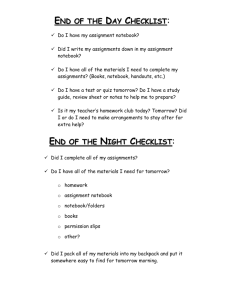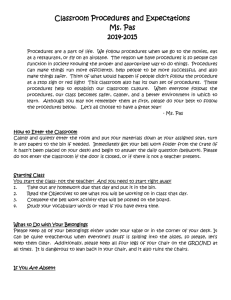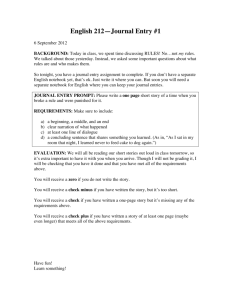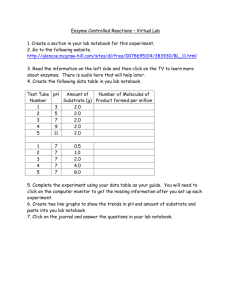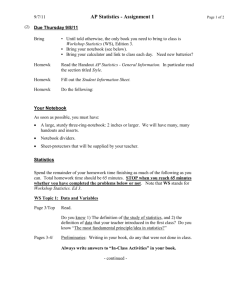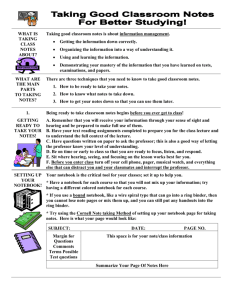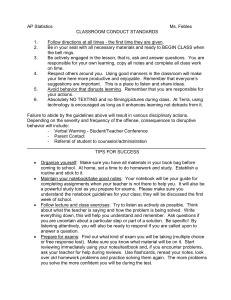Classroom Management Presentation Day 1
advertisement
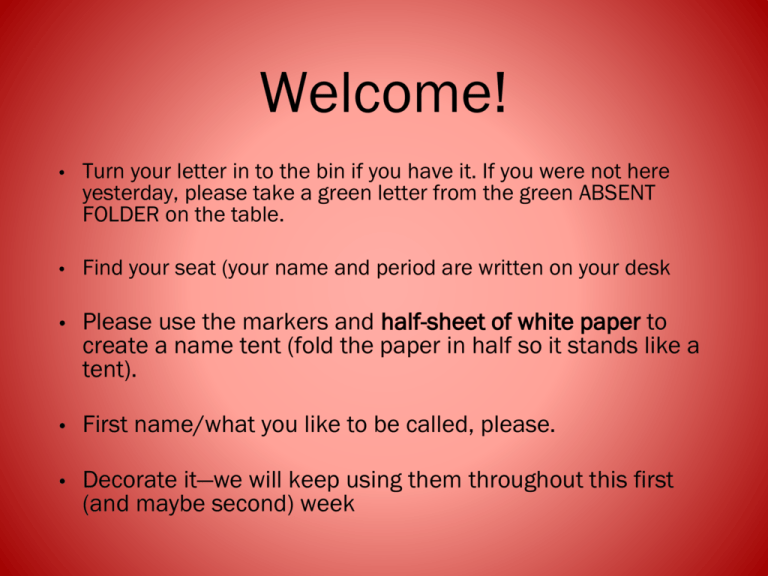
Welcome! • Turn your letter in to the bin if you have it. If you were not here yesterday, please take a green letter from the green ABSENT FOLDER on the table. • Find your seat (your name and period are written on your desk • Please use the markers and half-sheet of white paper to create a name tent (fold the paper in half so it stands like a tent). • First name/what you like to be called, please. • Decorate it—we will keep using them throughout this first (and maybe second) week Syllabus • Read, sign, and return on Friday Leonard’s Room How things run Classroom Plan • Most things that run well do so because of a carefully thought out plan. Thus, I’ve tried to think about just about every question you might have (What if I have to go the bathroom?; Where do I turn things in?; Will you accept my paper late?; etc.). • This presentation will be available on the class website soon, but take notes. In addition to helping you know your way around here, there will be a short quiz on Friday. • If you have any questions, please copy them down onto one of the post-its in your bin and save it for the end of class. If I don't get to your questions today, stick your note on the front board before leaving, and I will answer it during tomorrow’s portion. This will usually apply during direct instruction. Questions? • If you have any questions, please copy them down onto one of the post-its in your bin and save it for the end of class. If I don't get to your questions today, stick your note on the front board before leaving, and I will answer it during tomorrow’s portion. • This will usually apply during direct instruction. Today, we will cover: • Materials you need for this class and why • Entering the classroom/food & cell phones • Daily Writing assignments • The last 5 minutes of class • Bathroom sign-out sheet • The classroom signal For this class, you will need: *bring these items daily* • A binder. I recommend a 1’; can be used with other classes • Pencils and blue or black ink • Colored pencils or highlighters will be helpful • 4 or 5 dividers to break your binder into the following sections • 1 2-pronged folder. • • This will house all final drafts of writing assignments from throughout the year. When you leave this class, you will have a portfolio full of different genres of your writing. • It will also count as 10% of your final exam in here—both semesters. A composition notebook • To house your Daily Writing assignments and reflections/exit tickets. • It will be used daily, and it will remain here in the classroom. Your class bin is located on the right wall under the table. (It will be labeled with your class period soon) Hungry? Shoot. Me too, most likely. • Throw away or store any food/drink items with the exception of bottled water. • If I’ve provided you with something to eat, you can eat it, but please dispose of your trash before you leave. • Make sure your cell phones are off and away (out of sight; out of mind). There is a cell phone parking lot hanging near my desk. I doubt we will need to use it, but it’s yours in case you really are addicted. I’ll assign you a slot number, and I will keep you and your friends/family in my thoughts. • There will be BYOT days; I’ll let you know in advance. There will be times when I say, “Shoot, I don’t know. Look it up on your phone,” or “Take a picture of this,” but unless I’ve told you to, don’t take it out. If you are Snapchatting, Instagramming, or doing anything else off-topic, I’ll remember that for the next BYOT day/moment… • Definitely don’t charge your phone in here. Don’t ask to charge your phone in here. So, I’m here… My food is gone, and my cell phone is away. I’ve got my handy dandy supplies. What now? • When you come in, you will grab your composition notebook out of your class bin (located on the right wall under the table). You will see a Daily Writing prompt on the board. They should be self-explanatory. This is a time for you to write freely. I will periodically grab them and peruse, but you earn your Daily Writing grade by simply writing quietly the entire time, which is about 4-6 minutes. • 5 pts. each day, 25 pts. each week—that adds up! • To earn the 5 points, you must start as soon as the bell rings (that means you should have that pen/pencil handy), and write quietly until I say time’s up. • If you run out of things to say in response to the prompt, switch over and write about what’s going on with you. Maybe you’re really angry. Or sad. Or over the moon. Write about it! Getting your thoughts down on paper can be really therapeutic. • Let’s try it. I doubt you already have your composition notebook, so for this week only, you can write your DWs on a sheet of paper. Daily Writing Instructions • Write the date • Copy down the prompt • Write your response until time is called • Draw a line underneath your work to separate it from today’s reflection or tomorrow’s Daily Writing Who would you most like to sit here with, and why? (It can be anyone—dead, alive, famous; anyone.) How’d it go? Awesome. If I have to remind you, you won’t earn the 5 points. We’re talking about the easiest 5 points you will earn all day. • After I call time, I might ask if anyone wants to share. The DW prompt usually connects what we are about to do in class with your real life. That’s always the goal. • After the Daily Writing, we will take a look at our agenda and go over the daily objective. You may be asked to copy the objective down. The objective is, of course, the thing we are trying to achieve that day in class. • Now you know how you are going to spend the first six or seven minutes of this class practically every single day… What about the last five minutes? • It may vary, but you will most likely be completing an exit ticket or a reflection on the day’s activity in that very same composition notebook or on another sheet of paper. You may also be given time to clean up/return materials, as we often get a little messy in here. • One thing you will never do the last five minutes is line up at the door. It is my personal pet peeve. We will work up until the bell. • We will talk more about what you can do if you finish early tomorrow. While we’re talking about the first and last minutes of class, the reminds me… • The10/10 rule applies for going to bathroom • You must also refrain from leaving your seat—for the bathroom, to throw stuff away, to blow your nose, etc.) during direct instruction (that means when I’m up front explaining something). • With the exception of those times, you may use the restroom by signing out in the bathroom log and signing back in when you return. You do not need to ask beforehand. If you are out for an excessive amount of time, like 10 minutes, we have a problem. If you are signing out multiple times every week, you might have a problem. We’ll talk. • Remember how I said we get messy in here sometimes? We can also get pretty loud… • Often, you will be in groups and/or talking with a partner. When I need to get your attention as a whole class, I will ask you for the class signal. • When this happens, everyone should get quiet, stop working, look up at me, and give me the signal in return • Let’s see how fast we can do it… Who was paying attention? • Use the red/green sign in your bucket to indicate to me if a statement is true (green) or false (red). Hold the sign up, and show it to me quietly. • 1. You cannot eat in this class. If I provide you with something to eat, you have to take it with you and eat it when you leave. • 2. You will leave your composition notebook and your writing portfolio folder in class. • 3. If you have a question during direct instruction, raise your hand and patiently wait on me to call on you. • 4. You may sign out and use the restroom anytime except during the first and last ten minutes of class. • 5. Students lining up at the door when there are still valuable minutes left in class is my personal pet peeve. • 6. To “give me the signal” correctly, you just need to raise your hand back at me. • 7. Everyone must put their cell phone in the cell phone parking lot when they enter the room. Tomorrow… • How to turn things in • How to turn one thing in late and still get credit • How to get your make-up work/figure out what you missed if you were out • What to do if you finish an assignment early. • What happens if you can’t manage to follow these rules & procedures, despite viewing this awesome presentation about them. Exit Ticket • Before you leave, take a moment to think of a question you have for me. This can be a question about this class, about the room, about something I said to said, whatever. • I would also like you to think of one positive thing about this new school year and one concern you have about this new school year. • Write your question, your positive comment, and your concern on a sticky note. • Put your name on the sticky note, and stick it to the white “Question Board” near the back of the room. Clean up • Please make sure your chair is pushed in and that your desk is where it was when you entered the room. • Return items to your bucket Welcome! • Sit where you sat last week. New seats tomorrow, I promise! • Take out your folder, write your name on it, and pass it forward. • Take out your Daily Writing composition notebook. Daily Writing • In your mind, do you associate any specific jobs/behaviors/tendencies /habits/qualities with a specific gender? What are they? If you don’t, then what jobs/behaviors/tendencies /habits/qualities do you typically see other people associate with specific genders in our society? Traditional gender roles/typical gender roles • As we grow, we learn how to behave from those around us. In this socialization process, children are introduced to certain roles that are typically linked to their biological sex. The term "gender role" refers to society's concept of how men and women are expected to act and behave. Gender roles are based on norms, or standards, created by society. In American culture, masculine roles have traditionally been associated with strength, aggression, and dominance, while feminine roles have traditionally been associated with passivity, nurturing, and subordination. Source: Boundless. “Gender and Sociology.” Boundless Psychology. Boundless, 20 Aug. 2015. Retrieved 31 Aug. 2015 from https://www.boundless.com/psychology/textbooks/boundless-psychologytextbook/gender-and-sexuality-15/gender-414/gender-and-sociology-296-12831/ Alien Gender-Role Manual #4.) Add this in to #4. In your magazine, did you see a depiction of "typical gender roles" being adhered to? • Food for thought: What do you think this same type of magazine would have looked like in the '90s (in terms of gender roles)? #8.) Paradox: a statement that initially seems to contradict itself but, in fact, includes a fundamental truth • Add the word paradox to your vocabulary word list. Create a vocabulary word list by labeling a new sheet of paper “Vocabulary List,” adding the word paradox, and filing it in the vocab section of your binder. Exit Ticket • In your Daily Writing, you wrote about certain perceptions of gender in our society. Throughout the class activity today, you saw how the media can reinforce or shatter those perceptions. Now, I’d like you to think about/reflect on the sources and factors that influenced your personal perception of gender roles. Was it your parents? Certain role models? The movies you watched or books you read? Disney princes and princesses? What sources had the biggest influence on you, and how did they shape your ideas about gender roles?
